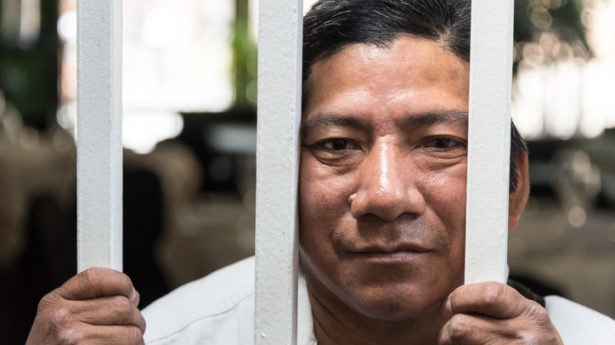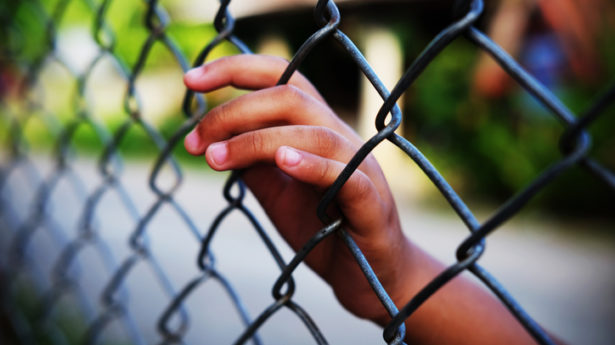The Unitarian Universalist Service Committee advances human rights through grassroots collaborations.
A Journey to the Heart of the Immigration Dilemma

By Raquel Bauman and Sylvia Cowan on May 15, 2019
Through the UU College of Social Justice, Raquel Bauman and Sylvia Cowan volunteered at the Karnes Detention Center near San Antonio, Texas, a facility currently housing undocumented fathers and their children. The following is their recollection of their trip to the facility.
Is there anywhere in the world where people in crisis do not seek greater security? Probably not. All living beings seek safety, no matter the risk or the obstacles – a place they can live and thrive.
Large numbers of people from Honduras, El Salvador and Guatemala continue to move north through Mexico toward the safety they hope for. They are congregating at ports of entry for the United States: Piedras Negras, Juarez, Matamoros, Laredo, El Paso, and many other spots along our desert border with Mexico. What causes people to leave the home they have known, to leave their family, friends, and neighbors, and embark on this long and dangerous journey?
Far from the border, in Bedford, Massachusetts, we’re part of a UU congregation that offers sanctuary to undocumented migrants at risk of deportation. We felt curious, inspired, and motivated to learn first-hand from those making the long journey north. The UU College of Social Justice invited us as Spanish-speaking volunteers to work with UUSC Texas-based partner RAICES (Refugee and Immigrant Center for Education and Legal Services), an organization based in San Antonio. We volunteered at the Karnes County Residential Center, with fathers who are detained there with their children, some of them only infants.
Our experience was eye-opening and heart-rending. Reading about the crisis is different from sitting in a small, windowless room and hearing of experiences that we can hardly imagine. Working with staff and other RAICES volunteers, we listened to accounts of extortion, homicides, and kidnapping; of fleeing from one part of a gang-controlled community to another; of going to the police and getting no help (several men carried worn copies of complaints filed with local authorities); and of finally fleeing, leaving behind homes, businesses, and families.
We translated these first-hand accounts from Spanish to English so that pro bono attorneys could use the information to support the fathers as they faced immigration officials and judges, seeking asylum. We watched the men’s sons playing in the large room, never out of their fathers’ sight. One man held a weeping six-month-old throughout the interview preparation session.
From eight in the morning until eight in the evening, we volunteers listened and translated and typed. We fell asleep exhausted each evening, ate breakfast early, and headed back to the detention center each morning for a week. We provided the detained fathers with information about the asylum process, the importance of keeping all appointments and court dates, and the need to enroll their children in school as soon as they arrived at their destination.
“Numbing” is the word that comes to mind to describe the sensation felt just before falling asleep each evening.
When our week of volunteering with RAICES was completed, we decided to travel. We knew there were 1,600 migrants at a vacant “maquiladora” (or factory) converted to a shelter in Piedras Negras, Coahuila, Mexico. So, we bought a quantity of water for them, and made our way across the border at Eagle Pass, Texas, where family members of the detainees we had worked with were waiting for us.
From behind the fence surrounding the shelter, we heard stories of migrants who had made the journey this far. Though the Coahuila government was providing shelter, mats, blankets, wi-fi, meals, and port-o-potties for the migrants, most had no knowledge that U.S. border guards were processing no more than 12 people per day—a tiny number in relation to the volume of asylum-seekers. They had come to cross, but now the border was inaccessible to most.
From Piedras Negras we drove to San Antonio to sit in on an immigration court. We then proceeded to the Greyhound bus station, where asylum-seekers who passed the first hurdle of U.S. government inquiry into their “credible fear” of returning home, arrived in anticipation of their next long journey to sponsors in Fort Lauderdale, Chicago, Memphis, San Francisco, and Dallas. As they sat waiting for their buses, they were given backpacks filled with supplies for the journey, donated by a local faith coalition in which many of the San Antonio UUs participate. RAICES staff and volunteers work here at the bus station too, emphasizing with the travelers how important it is to appear for court dates and ICE check-ins. We were delighted to recognize one father and son from our time in Karnes; they had made it through the official interview.
We are now back in Massachusetts, more deeply aware than ever of the enormity and complexity of immigration justice. Realizing we can’t do it all, we know that neither can we sit back and do nothing. We continue to work locally to bring awareness and attention to the humanity of those who are seeking a safe home. If we are to move our country closer to a truly fair immigration policy, we need to keep in mind not only the big picture of laws and policies, but also the faces and stories of the thousands of individual human beings who seek safety within our borders.
Photo Credit: iStock – AlexLinch
***
About UUSC: Guided by the belief that all people have inherent worth and dignity, UUSC advances human rights globally by partnering with affected communities who are confronting injustice, mobilizing to challenge oppressive systems, and inspiring and sustaining spiritually grounded activism for justice. We invite you to join us in this journey toward realizing a better future!

